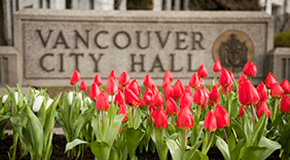CITY Council on Tuesday approved the framework for Vancouver’s first ever resilience strategy that provides a set of strategic objectives and actions to make Vancouver a safer, more inclusive and equitable place to live, work and play.
The Resilient Vancouver strategy looks at the major challenges and changes facing the city—now and in the future—and builds capacity for communities to adapt and thrive. It is the culmination of a two-year process involving more than 2,500 stakeholders, experts and community groups in addition to cross-departmental discussions within the City.
Vancouver, like many cities around the world, faces complex and interconnected challenges impacting the resilience of its residents, neighbourhoods, businesses and urban systems. Its capacity to plan for and mitigate the impacts of climate change, sea level rise, earthquakes and extreme weather, are impacted by social and economic inequity, aging infrastructure and the affordability crisis, says the City.
Collectively, its ability to adapt and transform in the face of these challenges will help it to be better prepared for both the expected and the unexpected. Resilience is the capacity of individuals, communities, institutions, businesses, and systems within a city to survive, adapt and thrive, no matter what kinds of chronic stresses and acute shocks they experience, according to the City.
The strategy includes a set of 12 strategic objectives and 45 actions that represent tangible steps the City can take to address critical gaps in its knowledge, and promote different ways of thinking and working with community to reduce risk and foster positive outcomes for more people today and in the future.
The Strategy is structured around three priority areas:
- Thriving and Prepared Neighbourhoods
- Proactive and Collaborative Government
- Safe, Adaptive Buildings and Infrastructure
Resilient Vancouver builds on a strong foundation of work underway across our communities, and promotes local action and partnerships to increase the city’s resilience. This will be achieved through wide-ranging initiatives, from the introduction of new modelling tools to the co-development of neighbourhood resilience action plans.
With Council’s endorsement, two immediate actions that will be taken over the coming months include:
Launching of a Resilient Neighbourhoods Program
Following success of the pilot-phase, the City will work with community partners to expand the Resilient Neighbourhoods Program which is a collaboration between community-based organizations, the City, and other partners to empower neighbourhood-led efforts related to emergency preparedness, climate adaptation, food security and community connection and well-being.
As part of this work, a Neighbourhood Resilience Toolkit will be made available in conjunction with a grant stream, so that community groups can engage with residents to work on preparing for shocks and stresses that will impact their lives, neighbourhoods and communities.
Developing Policy Options to Reduce Seismic Risk
Vancouver is at significant risk of a damaging earthquake. One of the major risks is damage to buildings.
Using new data and modelling technology and building on the latest earthquake science, the City is now in a position to evaluate how different building types will perform in an earthquake and how neighbourhoods, businesses and people could be impacted.
The analysis completed to date will be further refined over time. However, preliminary results provide useful insight into the risks to the City’s building stock and serve as a basis to move forward with discussions regarding the implications for the City.
In partnership with leading experts, Natural Resources Canada, and the Province of British Columbia, the City will refine its risk assessment and proceed with the development of a suite of policy options aimed at improving the performance of buildings in Vancouver, and reducing risk to residents, businesses and critical infrastructure.
Policy measures aimed at reducing seismic risk for existing buildings will be evaluated in conjunction with efforts to protect affordability, advance accessibility, and adapt to climate change.
Resilient Vancouver Strategy
Resilient Vancouver is the result of in-depth consultation with community and is informed by new research and analysis about local risks and hazards. It sets a foundation for a holistic approach to planning to reduce risk to the community, by elevating the voices of underrepresented groups in decisions and planning for disaster and climate change adaptation, response and recovery.
As part of the Resilience Strategy process, the City has already begun embedding resilience as an explicit objective in existing process, programs and policies. These efforts will continue with major planning initiatives such as the City-Wide Plan, the Employment Lands Study, and the development of the Poverty Reduction Strategy and Equity Framework.
Resilient Vancouver identifies key challenges it is likely to face—or is already facing—and make recommendations for how to protect against, and thrive in spite of, these issues. The full strategy and suite of actions will be finalized later this year.
For more information, visit the vancouver.ca/resilientcity.










